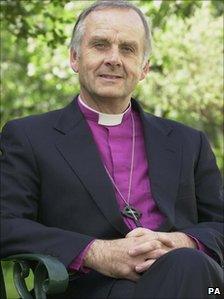Archbishop of Wales warns on portrayal of poor
- Published

Dr Barry Morgan was speaking at a service to mark the Tonypandy Riots
The Archbishop of Wales has criticised the way benefit claimants are being portrayed by the UK government.
Dr Barry Morgan said the mark of a civilised society was the way it cared for its worst off members.
He said the UK government "talks about benefit frauds, as if the country is full of people who are out to milk the system".
A Department for Work and Pensions spokesperson said welfare reforms were about trying to fix a broken system.
Dr Morgan, speaking at a service to mark the 100th anniversary of the Tonypandy Riots, said: "There are people who genuinely cannot work and if the state cannot take care of them in a proper way, then the whole society is damaged and diminished.
"There are enough psychological effects of not going to work every day, of not being able to provide for your children, without being accused as well, of being people who are work shy."
Dr Morgan also said the worst effects of the UK government's cuts had yet to be seen.
"Somebody said of the chancellor's speech that he laid out the price of everything of things that needed to be cut, but the value of nothing that he was cutting, such as libraries, public services, local government and the effect all of that has on communities," he said.
Chancellor George Osborne has said the UK government's approach is "hard but fair" and that by saving on welfare costs, it will free up funds for other government departments.
He said the Office for Budget Responsibility forecast that 490,000 public sector jobs would be shed over the four years of the Spending Review period.
Most will be through natural turnover, although there will be "some redundancies".
Work and Pensions Secretary Iain Duncan Smith last month told people in Merthyr Tydfil that they had become static and should seek work in Cardiff.
He suggested the unemployed "get on a bus" to find work.
Dr Morgan was speaking at a service at St Andrew's Church in Tonypandy, Rhondda Cynon Taf, to mark the start of events commemorating the centenary of the riots.
On 1 August, 1910, 800 miners were locked out of their Rhondda pit following a wage dispute.
Managers at the pit protected the colliery and powerhouse with around 100 policemen, but the lockout prompted miners at other collieries to strike.
Violence broke out and led to riots in Tonypandy. Home Secretary Winston Churchill sent in troops to support the police in their attempts to restore order.
Big Society
More than 500 people and 80 policemen were injured during the disturbances. One miner died of head injuries reportedly received from a policeman's baton.
Dr Morgan said: "One of the great characteristics of the mining communities was that they did care for the less fortunate - they made sure that widows and orphans had enough to eat and coal to heat their homes.
"They knew what it meant to be members of one society. The Big Society concept would not have been strange to them - they implemented it long before this government thought of it."
A Department for Work and Pensions spokesperson said: "Our benefit reforms are all about fixing a system that is currently broken, so that it's fairer on working people, who pay for it, whilst continuing to support vulnerable members of society, who rely on it.
"Through these reforms we're simplifying the system, which will make it more efficient and less open to abuse, and introducing a new Work Programme, which will provide more personalised support for the unemployed to help them into work."
- Published22 October 2010
- Published22 October 2010
- Published21 October 2010